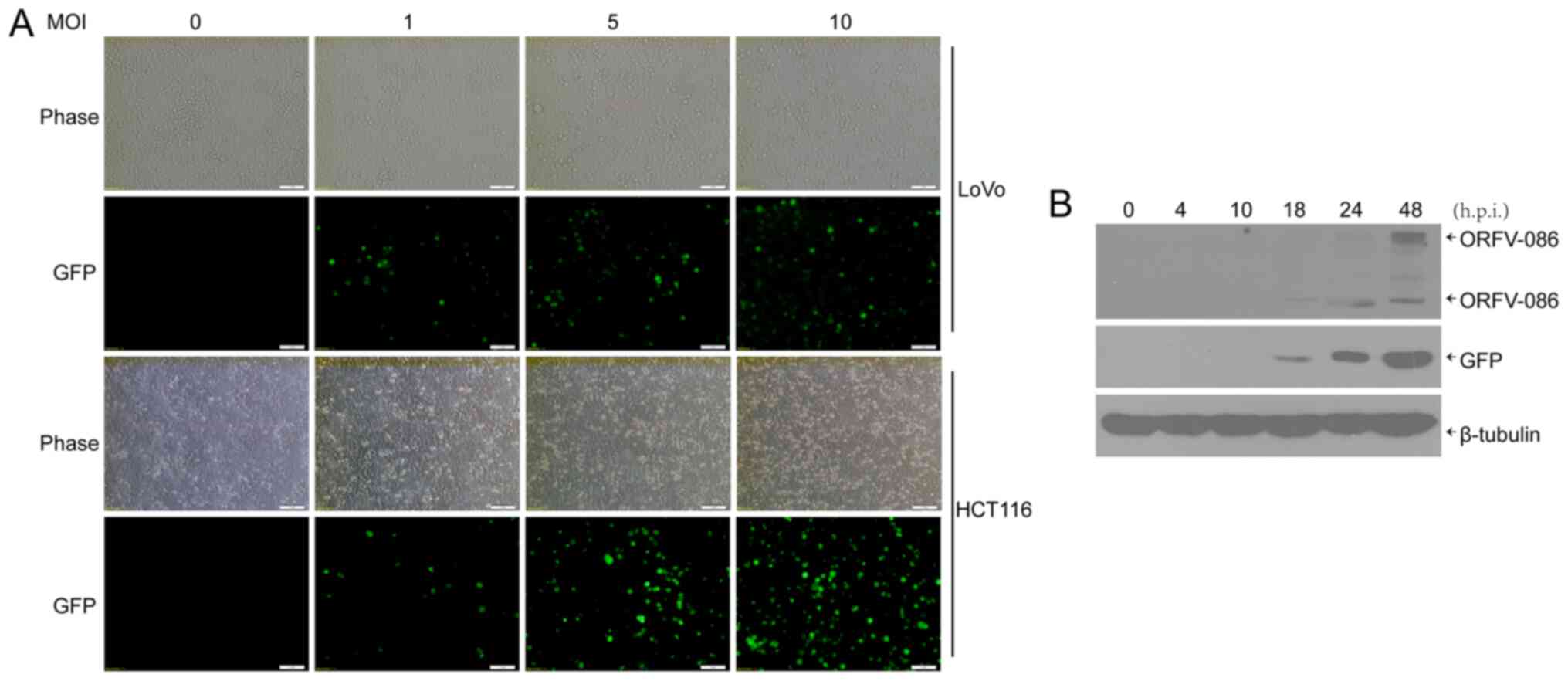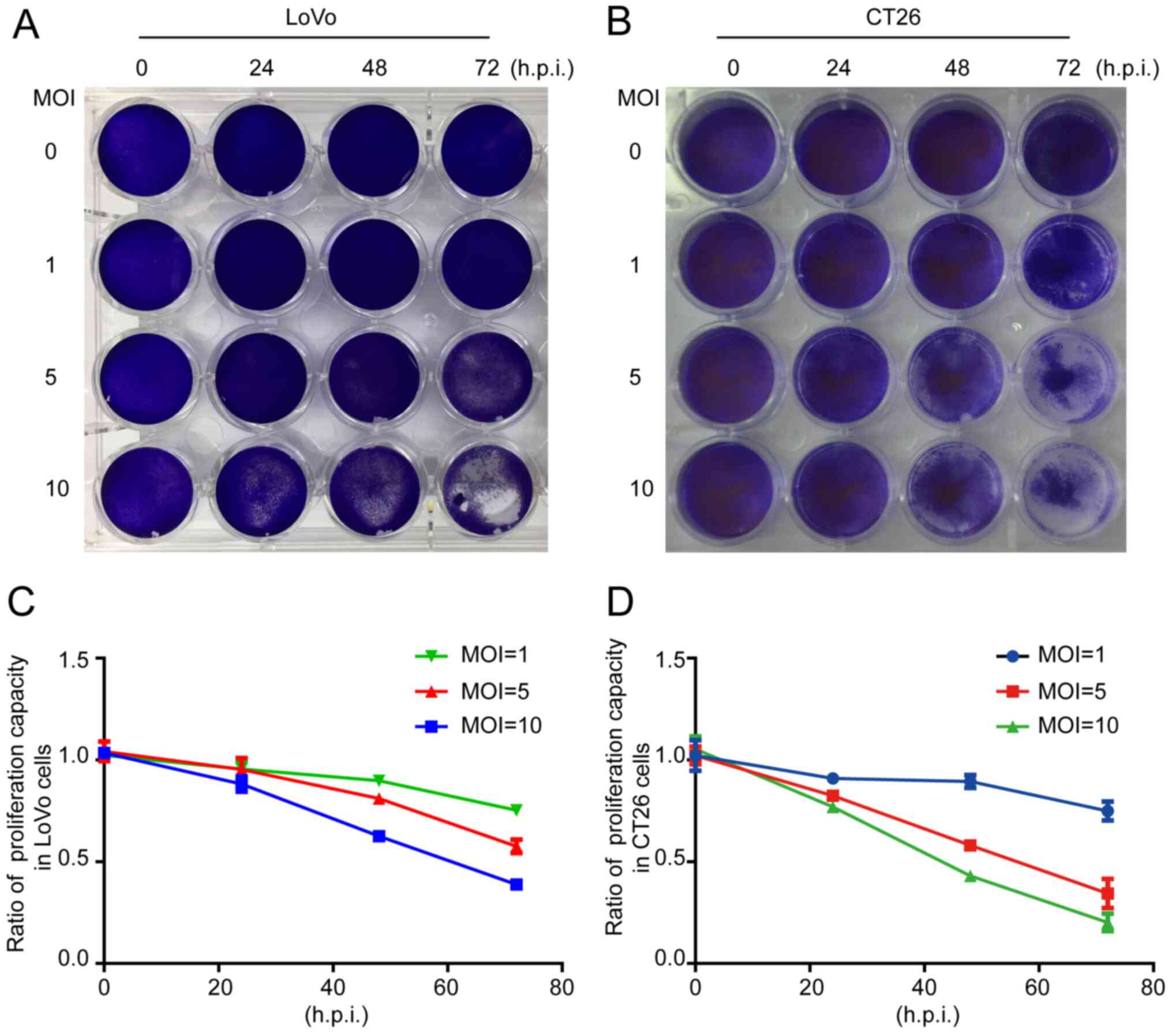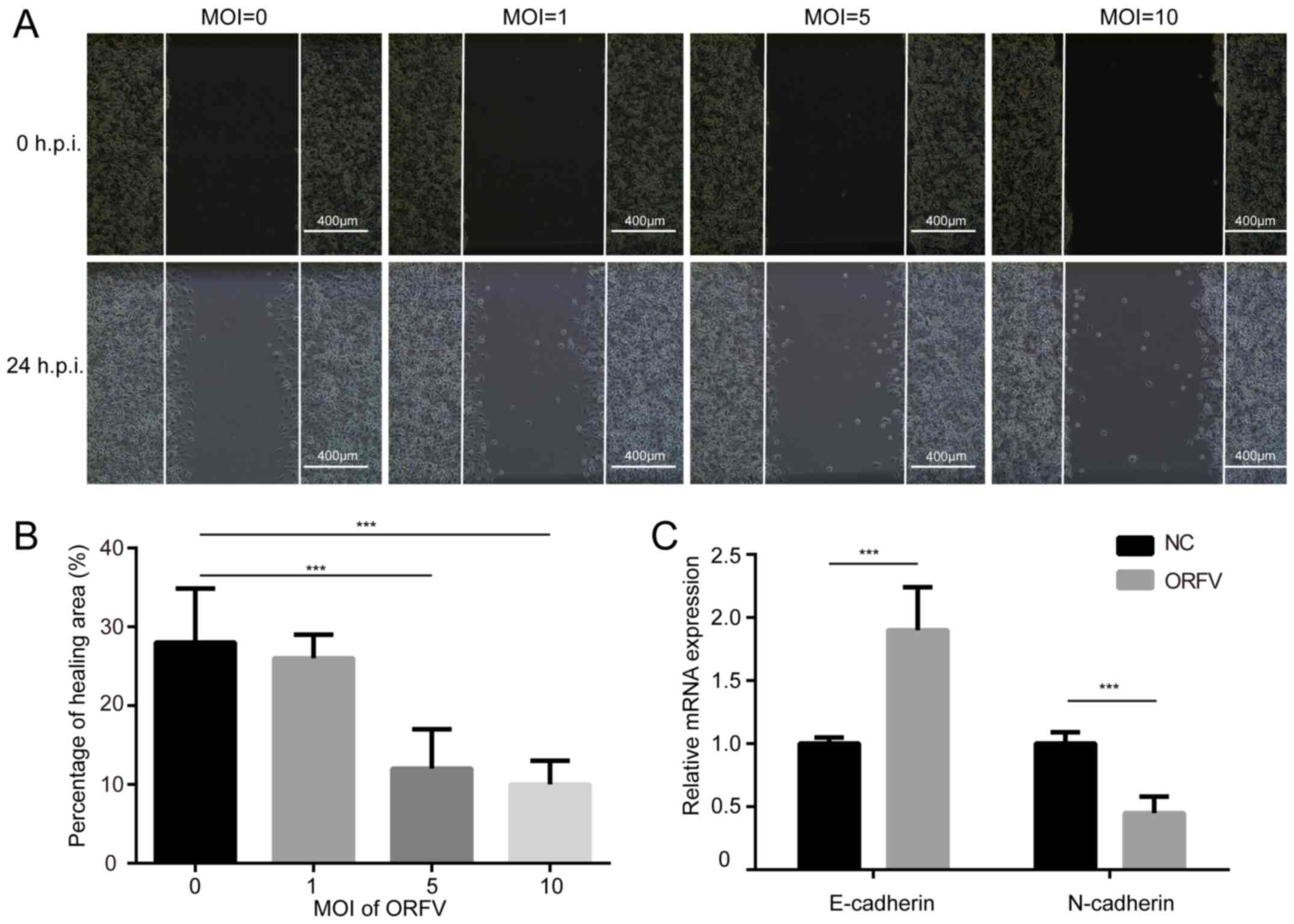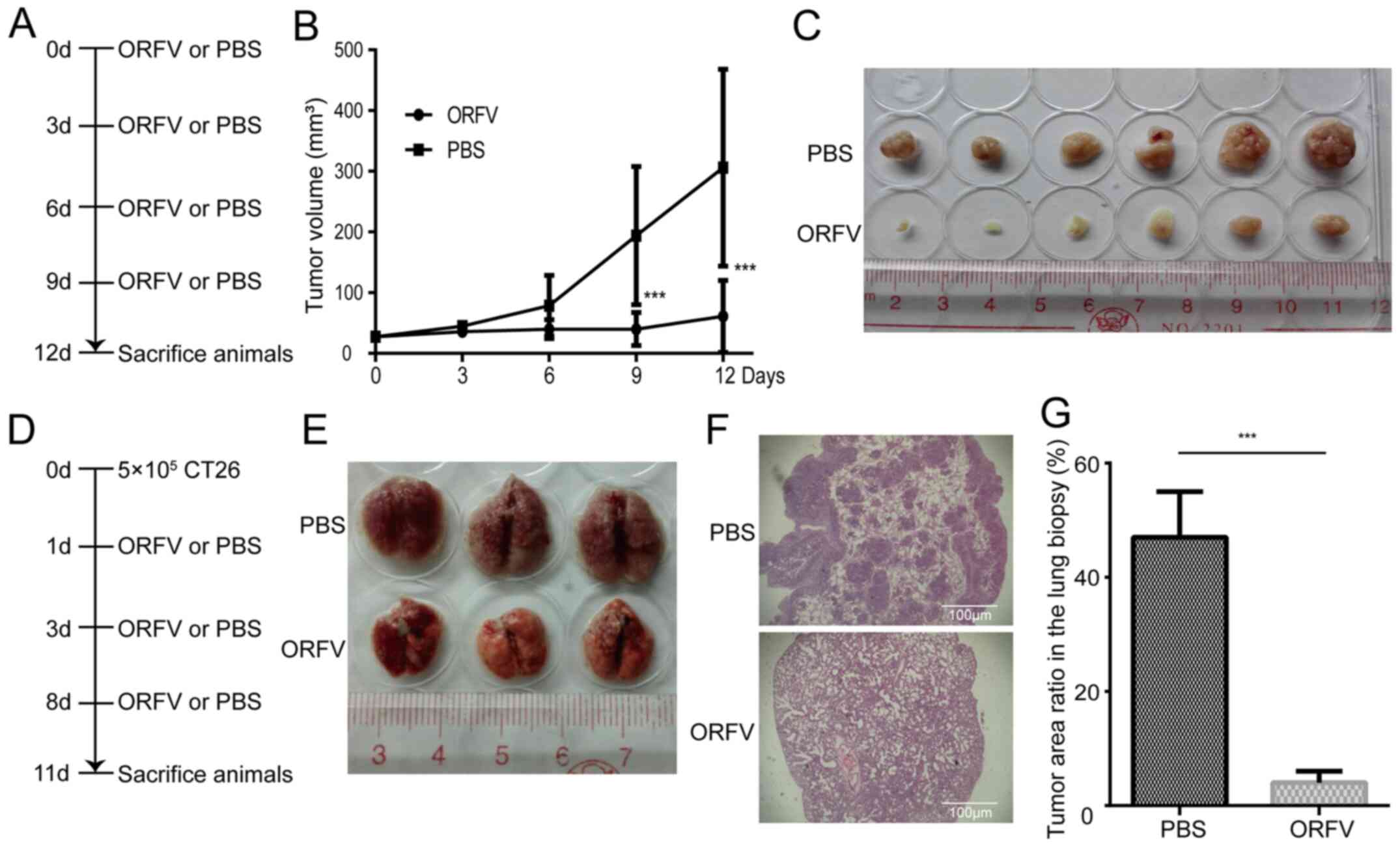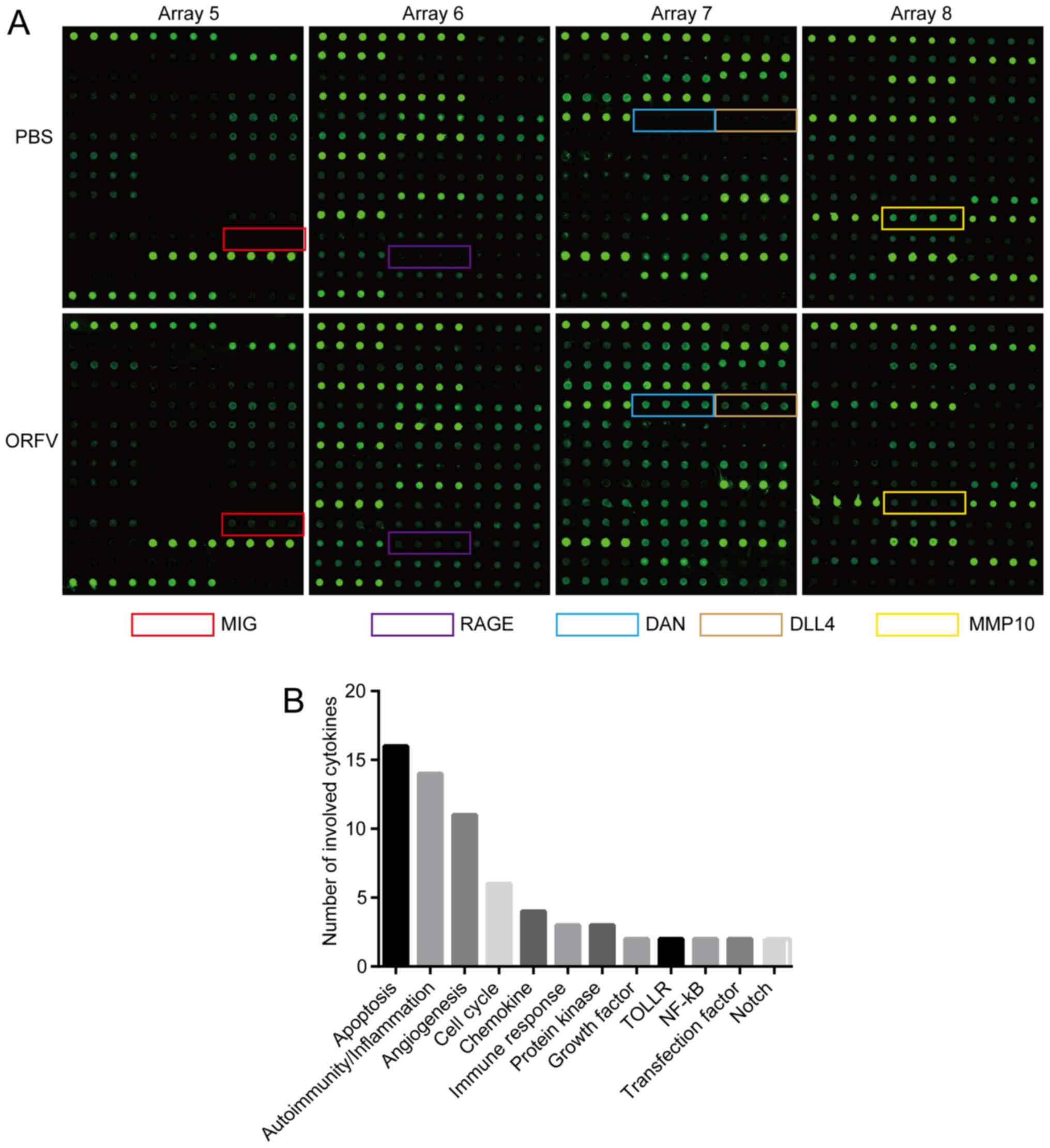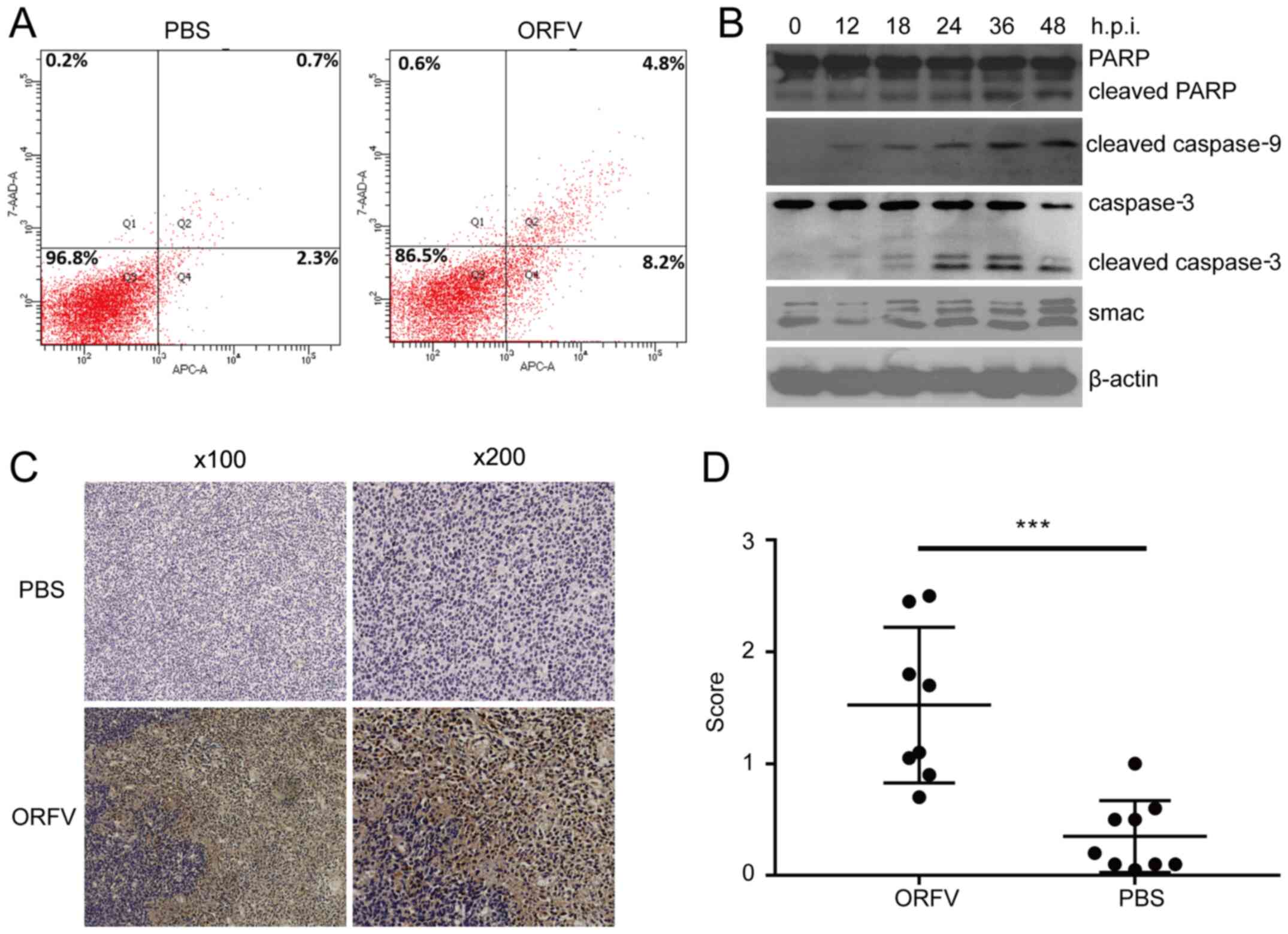|
1
|
Lawler SE, Speranza MC, Cho CF and Chiocca
EA: Oncolytic viruses in cancer treatment: A review. JAMA Oncol.
3:841–849. 2017. View Article : Google Scholar : PubMed/NCBI
|
|
2
|
Kaufman HL, Kohlhapp FJ and Zloza A:
Oncolytic viruses: A new class of immunotherapy drugs. Nat Rev Drug
Discov. 14:642–662. 2015. View
Article : Google Scholar : PubMed/NCBI
|
|
3
|
Mondal M, Guo J, He P and Zhou D: Recent
advances of oncolytic virus in cancer therapy. Hum Vaccin
Immunother. 16:2389–2402. 2020. View Article : Google Scholar : PubMed/NCBI
|
|
4
|
Raja J, Ludwig JM, Gettinger SN, Schalper
KA and Kim HS: Oncolytic virus immunotherapy: Future prospects for
oncology. J Immunother Cancer. 6:1402018. View Article : Google Scholar : PubMed/NCBI
|
|
5
|
Liu Z, Ravindranathan R, Kalinski P, Guo
ZS and Bartlett DL: Rational combination of oncolytic vaccinia
virus and PD-L1 blockade works synergistically to enhance
therapeutic efficacy. Nat Commun. 8:147542017. View Article : Google Scholar : PubMed/NCBI
|
|
6
|
Andtbacka RH, Kaufman HL, Collichio F,
Amatruda T, Senzer N, Chesney J, Delman KA, Spitler LE, Puzanov I,
Agarwala SS, et al: Talimogene laherparepvec improves durable
response rate in patients with advanced melanoma. J Clin Oncol.
33:2780–2788. 2015. View Article : Google Scholar : PubMed/NCBI
|
|
7
|
Hosamani M, Scagliarini A, Bhanuprakash V,
McInnes CJ and Singh RK: Orf: An update on current research and
future perspectives. Expert Rev Anti Infect Ther. 7:879–893. 2009.
View Article : Google Scholar : PubMed/NCBI
|
|
8
|
Wang R, Wang Y, Liu F and Luo S: Orf
virus: A promising new therapeutic agent. Rev Med Virol.
29:e20132019. View Article : Google Scholar : PubMed/NCBI
|
|
9
|
Fiebig HH, Siegling A, Volk HD, Friebe A,
Knolle P, Limmer A and Weber O: Inactivated orf virus
(Parapoxvirus ovis) induces antitumoral activity in
transplantable tumor models. Anticancer Res. 31:4185–4190.
2011.PubMed/NCBI
|
|
10
|
van Rooij EM, Rijsewijk FA, Moonen-Leusen
HW, Bianchi AT and Rziha HJ: Comparison of different prime-boost
regimes with DNA and recombinant Orf virus based vaccines
expressing glycoprotein D of pseudorabies virus in pigs. Vaccine.
28:1808–1813. 2010. View Article : Google Scholar : PubMed/NCBI
|
|
11
|
Rintoul JL, Lemay CG, Tai LH, Stanford MM,
Falls TJ, de Souza CT, Bridle BW, Daneshmand M, Ohashi PS, Wan Y,
et al: ORFV: A novel oncolytic and immune stimulating parapoxvirus
therapeutic. Mol Ther. 20:1148–1157. 2012. View Article : Google Scholar : PubMed/NCBI
|
|
12
|
Friebe A, Friederichs S, Scholz K, Janssen
U, Scholz C, Schlapp T, Mercer A, Siegling A, Volk HD and Weber O:
Characterization of immunostimulatory components of orf virus
(parapoxvirus ovis). J Gen Virol. 92:1571–1584. 2011.
View Article : Google Scholar : PubMed/NCBI
|
|
13
|
Tai LH, de Souza CT, Bélanger S, Ly L,
Alkayyal AA, Zhang J, Rintoul JL, Ananth AA, Lam T, Breitbach CJ,
et al: Preventing postoperative metastatic disease by inhibiting
surgery-induced dysfunction in natural killer cells. Cancer Res.
73:97–107. 2013. View Article : Google Scholar : PubMed/NCBI
|
|
14
|
Breitbach CJ, Paterson JM, Lemay CG, Falls
TJ, McGuire A, Parato KA, Stojdl DF, Daneshmand M, Speth K, Kirn D,
et al: Targeted inflammation during oncolytic virus therapy
severely compromises tumor blood flow. Mol Ther. 15:1686–1693.
2007. View Article : Google Scholar : PubMed/NCBI
|
|
15
|
Cai J, Lin Y, Zhang H, Liang J, Tan Y,
Cavenee WK and Yan G: Selective replication of oncolytic virus M1
results in a bystander killing effect that is potentiated by Smac
mimetics. Proc Natl Acad Sci USA. 114:6812–6817. 2017.PubMed/NCBI
|
|
16
|
Warner SG, Haddad D, Au J, Carson JS,
O'Leary MP, Lewis C, Monette S and Fong Y: Oncolytic herpes simplex
virus kills stem-like tumor-initiating colon cancer cells. Mol Ther
Oncolytics. 3:160132016. View Article : Google Scholar : PubMed/NCBI
|
|
17
|
Weber O, Mercer AA, Friebe A, Knolle P and
Volk HD: Therapeutic immunomodulation using a virus - the potential
of inactivated orf virus. Eur J Clin Microbiol Infect Dis.
32:451–460. 2013. View Article : Google Scholar : PubMed/NCBI
|
|
18
|
Haig DM and McInnes CJ: Immunity and
counter-immunity during infection with the parapoxvirus orf virus.
Virus Res. 88:3–16. 2002. View Article : Google Scholar : PubMed/NCBI
|
|
19
|
Chen D, Long M, Xiao B, Xiong Y, Chen H,
Chen Y, Kuang Z, Li M, Wu Y, Rock DL, et al: Transcriptomic
profiles of human foreskin fibroblast cells in response to orf
virus. Oncotarget. 8:58668–58685. 2017. View Article : Google Scholar : PubMed/NCBI
|
|
20
|
Wang Y, Tong S, Li W, Gao F, Ning Z and
Luo S: In vitro cultivation of primary ovine fetal turbinate cells
and its application in researches of ovine orf virus. Zhongguo
Shouyi Kexue. 43:470–475. 2013.(In Chinese).
|
|
21
|
Li W, Ning Z, Hao W, Song D, Gao F, Zhao
K, Liao X, Li M, Rock DL and Luo S: Isolation and phylogenetic
analysis of orf virus from the sheep herd outbreak in northeast
China. BMC Vet Res. 8:2292012. View Article : Google Scholar : PubMed/NCBI
|
|
22
|
LaBarre DD and Lowy RJ: Improvements in
methods for calculating virus titer estimates from
TCID50 and plaque assays. J Virol Methods. 96:107–126.
2001. View Article : Google Scholar : PubMed/NCBI
|
|
23
|
Ning Z, Peng Y, Hao W, Duan C, Rock DL and
Luo S: Generation of recombinant Orf virus using an enhanced green
fluorescent protein reporter gene as a selectable marker. BMC Vet
Res. 7:802011. View Article : Google Scholar : PubMed/NCBI
|
|
24
|
Livak KJ and Schmittgen TD: Analysis of
relative gene expression data using real-time quantitative PCR and
the 2(-Delta Delta C(T)) method. Methods. 25:402–408. 2001.
View Article : Google Scholar : PubMed/NCBI
|
|
25
|
Akiba H, Nakano H, Nishinaka S, Shindo M,
Kobata T, Atsuta M, Morimoto C, Ware CF, Malinin NL, Wallach D, et
al: CD27, a member of the tumor necrosis factor receptor
superfamily, activates NF-kappaB and stress-activated protein
kinase/c-Jun N-terminal kinase via TRAF2, TRAF5, and
NF-kappaB-inducing kinase. J Biol Chem. 273:13353–13358. 1998.
View Article : Google Scholar : PubMed/NCBI
|
|
26
|
Brocker C, Thompson D, Matsumoto A, Nebert
DW and Vasiliou V: Evolutionary divergence and functions of the
human interleukin (IL) gene family. Hum Genomics. 5:30–55. 2010.
View Article : Google Scholar : PubMed/NCBI
|
|
27
|
Gaffen SL and Liu KD: Overview of
interleukin-2 function, production and clinical applications.
Cytokine. 28:109–123. 2004. View Article : Google Scholar : PubMed/NCBI
|
|
28
|
Kuchen S, Robbins R, Sims GP, Sheng C,
Phillips TM, Lipsky PE and Ettinger R: Essential role of IL-21 in B
cell activation, expansion, and plasma cell generation during
CD4+ T cell-B cell collaboration. J Immunol.
179:5886–5896. 2007. View Article : Google Scholar : PubMed/NCBI
|
|
29
|
Or R, Abdul-Hai A and Ben-Yehuda A:
Reviewing the potential utility of interleukin-7 as a promoter of
thymopoiesis and immune recovery. Cytokines Cell Mol Ther.
4:287–294. 1998.PubMed/NCBI
|
|
30
|
Prasad KV, Ao Z, Yoon Y, Wu MX, Rizk M,
Jacquot S and Schlossman SF: CD27, a member of the tumor necrosis
factor receptor family, induces apoptosis and binds to Siva, a
proapoptotic protein. Proc Natl Acad Sci USA. 94:6346–6351. 1997.
View Article : Google Scholar : PubMed/NCBI
|
|
31
|
Steel JC, Waldmann TA and Morris JC:
Interleukin-15 biology and its therapeutic implications in cancer.
Trends Pharmacol Sci. 33:35–41. 2012. View Article : Google Scholar : PubMed/NCBI
|
|
32
|
Wang B, Tan Z and Guan F: Tumor-derived
exosomes mediate the instability of cadherins and promote tumor
progression. Int J Mol Sci. 20:36522019. View Article : Google Scholar
|
|
33
|
Petrova YI, Schecterson L and Gumbiner BM:
Roles for E-cadherin cell surface regulation in cancer. Mol Biol
Cell. 27:3233–3244. 2016. View Article : Google Scholar : PubMed/NCBI
|
|
34
|
Mrozik KM, Blaschuk OW, Cheong CM,
Zannettino AC and Vandyke K: N-cadherin in cancer metastasis, its
emerging role in haematological malignancies and potential as a
therapeutic target in cancer. BMC Cancer. 18:9392018. View Article : Google Scholar : PubMed/NCBI
|
|
35
|
Voigt H, Merant C, Wienhold D, Braun A,
Hutet E, Le Potier MF, Saalmüller A, Pfaff E and Büttner M:
Efficient priming against classical swine fever with a safe
glycoprotein E2 expressing Orf virus recombinant (ORFV VrV-E2).
Vaccine. 25:5915–5926. 2007. View Article : Google Scholar : PubMed/NCBI
|
|
36
|
Fischer T, Planz O, Stitz L and Rziha HJ:
Novel recombinant parapoxvirus vectors induce protective humoral
and cellular immunity against lethal herpesvirus challenge
infection in mice. J Virol. 77:9312–9323. 2003. View Article : Google Scholar : PubMed/NCBI
|
|
37
|
Li W, Hao W, Peng Y, Duan C, Tong C, Song
D, Gao F, Li M, Rock DL and Luo S: Comparative genomic sequence
analysis of Chinese orf virus strain NA1/11 with other
parapoxviruses. Arch Virol. 160:253–266. 2015. View Article : Google Scholar : PubMed/NCBI
|
|
38
|
Aruga A: Current status and future
perspective of cancer immunotherapy - clinical application and
development. Nihon Geka Gakkai Zasshi. 114:327–331. 2013.(In
Japanese). PubMed/NCBI
|
|
39
|
Lapeyre-Prost A, Terme M, Pernot S,
Pointet AL, Voron T, Tartour E and Taieb J: Immunomodulatory
activity of VEGF in cancer. Int Rev Cell Mol Biol. 330:295–342.
2017. View Article : Google Scholar : PubMed/NCBI
|
|
40
|
Poesen K, Lambrechts D, Van Damme P,
Dhondt J, Bender F, Frank N, Bogaert E, Claes B, Heylen L, Verheyen
A, et al: Novel role for vascular endothelial growth factor (VEGF)
receptor-1 and its ligand VEGF-B in motor neuron degeneration. J
Neurosci. 28:10451–10459. 2008. View Article : Google Scholar : PubMed/NCBI
|
|
41
|
Shutter JR, Scully S, Fan W, Richards WG,
Kitajewski J, Deblandre GA, Kintner CR and Stark KL: Dll4, a novel
Notch ligand expressed in arterial endothelium. Genes Dev.
14:1313–1318. 2000.PubMed/NCBI
|
|
42
|
Fernandez EJ and Lolis E: Structure,
function, and inhibition of chemokines. Annu Rev Pharmacol Toxicol.
42:469–499. 2002. View Article : Google Scholar : PubMed/NCBI
|
|
43
|
Abel S, Hundhausen C, Mentlein R, Schulte
A, Berkhout TA, Broadway N, Hartmann D, Sedlacek R, Dietrich S,
Muetze B, et al: The transmembrane CXC-chemokine ligand 16 is
induced by IFN-gamma and TNF-alpha and shed by the activity of the
disintegrin-like metalloproteinase ADAM10. J Immunol.
172:6362–6372. 2004. View Article : Google Scholar : PubMed/NCBI
|
|
44
|
Bouchon A, Dietrich J and Colonna M:
Cutting edge: Inflammatory responses can be triggered by TREM-1, a
novel receptor expressed on neutrophils and monocytes. J Immunol.
164:4991–4995. 2000. View Article : Google Scholar : PubMed/NCBI
|
|
45
|
Ma B, Zhu Z, Homer RJ, Gerard C, Strieter
R and Elias JA: The C10/CCL6 chemokine and CCR1 play critical roles
in the pathogenesis of IL-13-induced inflammation and remodeling. J
Immunol. 172:1872–1881. 2004. View Article : Google Scholar : PubMed/NCBI
|
|
46
|
Hermani A, De Servi B, Medunjanin S,
Tessier PA and Mayer D: S100A8 and S100A9 activate MAP kinase and
NF-kappaB signaling pathways and trigger translocation of RAGE in
human prostate cancer cells. Exp Cell Res. 312:184–197. 2006.
View Article : Google Scholar : PubMed/NCBI
|
|
47
|
Dahlmann M, Okhrimenko A, Marcinkowski P,
Osterland M, Herrmann P, Smith J, Heizmann CW, Schlag PM and Stein
U: RAGE mediates S100A4-induced cell motility via MAPK/ERK and
hypoxia signaling and is a prognostic biomarker for human
colorectal cancer metastasis. Oncotarget. 5:3220–3233. 2014.
View Article : Google Scholar : PubMed/NCBI
|
|
48
|
Upadhyay P, Gardi N, Desai S, Chandrani P,
Joshi A, Dharavath B, Arora P, Bal M, Nair S and Dutt A: Genomic
characterization of tobacco/nut chewing HPV-negative early stage
tongue tumors identify MMP10 asa candidate to predict metastases.
Oral Oncol. 73:56–64. 2017. View Article : Google Scholar : PubMed/NCBI
|
|
49
|
Croce CM and Reed JC: Finally, an
apoptosis-targeting therapeutic for cancer. Cancer Res.
76:5914–5920. 2016. View Article : Google Scholar : PubMed/NCBI
|
|
50
|
Loya SM and Zhang X: Enhancing the
bystander killing effect of an oncolytic HSV by arming it with a
secretable apoptosis activator. Gene Ther. 22:237–246. 2015.
View Article : Google Scholar : PubMed/NCBI
|
|
51
|
Wei X, Liu L, Wang G, Li W, Xu K, Qi H,
Liu H, Shen J, Li Z and Shao J: Potent antitumor activity of the
Ad5/11 chimeric oncolytic adenovirus combined with interleukin-24
for acute myeloid leukemia via induction of apoptosis. Oncol Rep.
33:111–118. 2015. View Article : Google Scholar : PubMed/NCBI
|
|
52
|
Raeber ME, Zurbuchen Y, Impellizzieri D
and Boyman O: The role of cytokines in T-cell memory in health and
disease. Immunol Rev. 283:176–193. 2018. View Article : Google Scholar : PubMed/NCBI
|
|
53
|
Vial J, Royet A, Cassier P, Tortereau A,
Dinvaut S, Maillet D, Gratadou-Hupon L, Creveaux M, Sadier A,
Tondeur G, et al: The ectodysplasin receptor EDAR acts as a tumor
suppressor in melanoma by conditionally inducing cell death. Cell
Death Differ. 26:443–454. 2019. View Article : Google Scholar : PubMed/NCBI
|
|
54
|
Huang ZM, Du SH, Huang LG, Li JH, Xiao L
and Tong P: Leptin promotes apoptosis and inhibits autophagy of
chondrocytes through upregulating lysyl oxidase-like 3 during
osteoarthritis pathogenesis. Osteoarthritis Cartilage.
24:1246–1253. 2016. View Article : Google Scholar : PubMed/NCBI
|
|
55
|
Yuan X, Gajan A, Chu Q, Xiong H, Wu K and
Wu GS: Developing TRAIL/TRAIL death receptor-based cancer
therapies. Cancer Metastasis Rev. 37:733–748. 2018. View Article : Google Scholar : PubMed/NCBI
|















